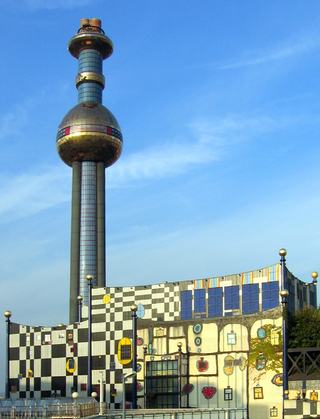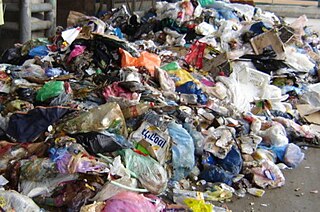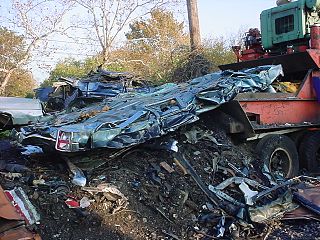
Recycling is the process of converting waste materials into new materials and objects. This concept often includes the recovery of energy from waste materials. The recyclability of a material depends on its ability to reacquire the properties it had in its original state. It is an alternative to "conventional" waste disposal that can save material and help lower greenhouse gas emissions. It can also prevent the waste of potentially useful materials and reduce the consumption of fresh raw materials, reducing energy use, air pollution and water pollution.

Incineration is a waste treatment process that involves the combustion of substances contained in waste materials. Industrial plants for waste incineration are commonly referred to as waste-to-energy facilities. Incineration and other high-temperature waste treatment systems are described as "thermal treatment". Incineration of waste materials converts the waste into ash, flue gas and heat. The ash is mostly formed by the inorganic constituents of the waste and may take the form of solid lumps or particulates carried by the flue gas. The flue gases must be cleaned of gaseous and particulate pollutants before they are dispersed into the atmosphere. In some cases, the heat that is generated by incineration can be used to generate electric power.

Scrap consists of recyclable materials, usually metals, left over from product manufacturing and consumption, such as parts of vehicles, building supplies, and surplus materials. Unlike waste, scrap has monetary value, especially recovered metals, and non-metallic materials are also recovered for recycling. Once collected, the materials are sorted into types — typically metal scrap will be crushed, shredded, and sorted using mechanical processes.

A materials recovery facility, materials reclamation facility, materials recycling facility or multi re-use facility is a specialized plant that receives, separates and prepares recyclable materials for marketing to end-user manufacturers. Generally, there are two different types: clean and dirty materials recovery facilities.

Municipal solid waste (MSW), commonly known as trash or garbage in the United States and rubbish in Britain, is a waste type consisting of everyday items that are discarded by the public. "Garbage" can also refer specifically to food waste, as in a garbage disposal; the two are sometimes collected separately. In the European Union, the semantic definition is 'mixed municipal waste,' given waste code 20 03 01 in the European Waste Catalog. Although the waste may originate from a number of sources that has nothing to do with a municipality, the traditional role of municipalities in collecting and managing these kinds of waste have produced the particular etymology 'municipal.'

Refuse-derived fuel (RDF) is a fuel produced from various types of waste such as municipal solid waste (MSW), industrial waste or commercial waste.
Renewable natural gas (RNG), also known as biomethane, is a biogas which has been upgraded to a quality similar to fossil natural gas and has a methane concentration of 90% or greater. By removing CO2 and other impurities from biogas, and increasing the concentration of methane to a level similar to fossil natural gas, it becomes possible to distribute RNG via existing gas pipeline infrastructure. RNG can be used in existing appliances, including vehicles with natural gas burning engines (natural gas vehicles).

Waste-to-energy (WtE) or energy-from-waste (EfW) is the process of generating energy in the form of electricity and/or heat from the primary treatment of waste, or the processing of waste into a fuel source. WtE is a form of energy recovery. Most WtE processes generate electricity and/or heat directly through combustion, or produce a combustible fuel commodity, such as methane, methanol, ethanol or synthetic fuels, often derived from the product syngas.
A mechanical biological treatment (MBT) system is a type of waste processing facility that combines a sorting facility with a form of biological treatment such as composting or anaerobic digestion. MBT plants are designed to process mixed household waste as well as commercial and industrial wastes.

FCC Environment (UK) Limited is a waste management company headquartered in Northampton, United Kingdom and a wholly owned subsidiary of Fomento de Construcciones y Contratas. It was formed in May 2012 through the merger and rebranding of Focsa Services and Waste Recycling Group.

Biffa Limited is a waste management company headquartered in High Wycombe, England. It provides collection, landfill, recycling and special waste services to local authorities and industrial and commercial clients in the United Kingdom. As of 2017, it was the UK's second-largest waste-management company.

The shredding of automobiles and major household appliances is a process where a hammermill acts as a giant tree chipper by grinding the materials fed into it to fist-size pieces. The shredding of automobiles results in a mixture of ferrous metal, non-ferrous metal and shredder waste, called automotive shredder residue or automobile shredder residue (ASR). ASR consists of glass, fiber, rubber, automobile liquids, plastics and dirt. ASR is sometimes differentiated into shredder light fraction and dust. Sometimes these residual materials are called "car-fluff".
There is no national law in the United States that mandates recycling. State and local governments often introduce their own recycling requirements. In 2014, the recycling/composting rate for municipal solid waste in the U.S. was 34.6%. A number of U.S. states, including California, Connecticut, Delaware, Hawaii, Iowa, Maine, Massachusetts, Michigan, New York, Oregon, and Vermont have passed laws that establish deposits or refund values on beverage containers while other jurisdictions rely on recycling goals or landfill bans of recyclable materials.

Vehicle recycling is the dismantling of vehicles for spare parts. At the end of their useful life, vehicles have value as a source of spare parts and this has created a vehicle dismantling industry. The industry has various names for its business outlets including wrecking yard, auto dismantling yard, car spare parts supplier, and recently, auto or vehicle recycling. Vehicle recycling has always occurred to some degree but in recent years manufacturers have become involved in the process. A car crusher is often used to reduce the size of scrapped vehicles for simplified transportation to a steel mill.

Ze-gen, Inc. was a renewable energy company developing advanced gasification technology to convert waste into synthesis gas. Founded in 2004, Ze-gen was a venture-backed company based in Boston, Massachusetts.
SUEZ Recycling and Recovery UK Ltd, formerly SITA UK Limited, is a British waste management company, established in 1988. It was previously called Sitaclean Technology. It began as a provider of local authority services, with its first municipal services contract in Erewash, Derbyshire in 1989. Suez has expanded its business through a combination of new contracts, joint venture partnerships and acquisitions.
Plasma gasification is in commercial use as a waste-to-energy system that converts municipal solid waste, tires, hazardous waste, and sewage sludge into synthesis gas (syngas) containing hydrogen and carbon monoxide that can be used to generate power. Municipal-scale waste disposal plasma arc facilities have been in operation in Japan and China since 2002. No commercial implementations in Europe and North America have succeeded so far. The technology is characterized by the potential of very high level of destruction of the incoming waste, but low or negative net energy production and high operational costs.
A scrap metal shredder, also sometimes referred to as a metal scrap shredder, is a machine used for reducing the size of scrap metal. Scrap metal shredders come in many different variations and sizes.

Wilton International is a multi-occupancy industrial area between Eston and Redcar, North Yorkshire, England. Originally a chemical plant, it has businesses in a variety of fields including energy generation, plastic recycling and process research. It is named after a village to the south of the area.

MBA Polymers is a recycling company with operations globally that recovers plastics from waste electrical and electronic equipment (WEEE) and auto-shredder residue from end-of-life automobiles (ELV).













